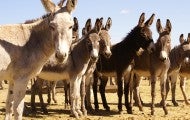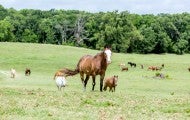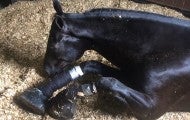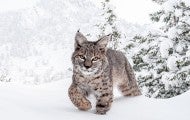WASHINGTON—Keith Dane, senior director of Equine Protection at the Humane Society of the United States, released the following statement regarding the race at Churchill Downs: "The absence of horse deaths at the Kentucky Derby is welcome news, not least because it demonstrates what is possible under...
WASHINGTON— As racing commences at Churchill Downs ahead of the 150th Kentucky Derby, the Humane Society of the United States and Humane Society Legislative Fund call for change to address the devastating loss of horse life at each of the Triple Crown races last year, and racing in general. The dark...
Fertility control: Essential to American wild burros and mustangs While wild burros are legally viewed in the same light as the American mustang, protected as a living symbol of the American West, the wild horses often seem to receive most of the public's attention. But burros have played a critical...
WASHINGTON - The Humane Society of the United States released today the results of a disturbing undercover investigation into two wildlife killing contests in Frederick County and in Waldorf, Maryland. Investigators documented the judging portions of the events, with participants lining up rows of...
Keith Dane, senior director of equine protection for the Humane Society of the United States released this statement in response to yet another tragedy within the horse racing industry after a horse had to be euthanized, Saturday, after the final leg of the Triple Crown: "As the third race of the...
WASHINGTON—The Prevent All Soring Tactics (PAST) Act, H.R. 3090, which aims to put an end to the cruel practice of horse soring, has been reintroduced in the U.S. House of Representatives with a strong bipartisan set of 185 original co-sponsors led by Reps. Brian Fitzpatrick, R-Pa., Steve Cohen, D...
Today, the U.S. Department of Agriculture announced a long-awaited final rule that would help end horse soring, an extremely cruel practice in which trainers secretly and deliberately cause intense pain to show horses to produce the “Big Lick,” an exaggerated, high-stepping gait rewarded by judges...
In a quiet corner of Black Beauty Ranch, on a stone plinth beneath a maple tree, there’s an oval etching of a man and a burro. The man is Cleveland Amory, author and founder of the Fund for Animals, and the burro is Friendly, one of the first animals to call the sanctuary home. The two met in 1980...
Soring involves the intentional infliction of pain to a horse's legs or hooves in order to force the horse to perform an artificial, exaggerated gait. Caustic chemicals—blistering agents like mustard oil, diesel fuel and kerosene—are applied to the horse's limbs, causing extreme pain and suffering...
MURCHISON, Texas—The wild Assateague Island horse who was removed from the Maryland tourist attraction by the National Park Service last month, is settling in seamlessly at Black Beauty Ranch, part of the Humane Society of the United States. The 13-year-old horse named Delegate’s Pride—also known as...




